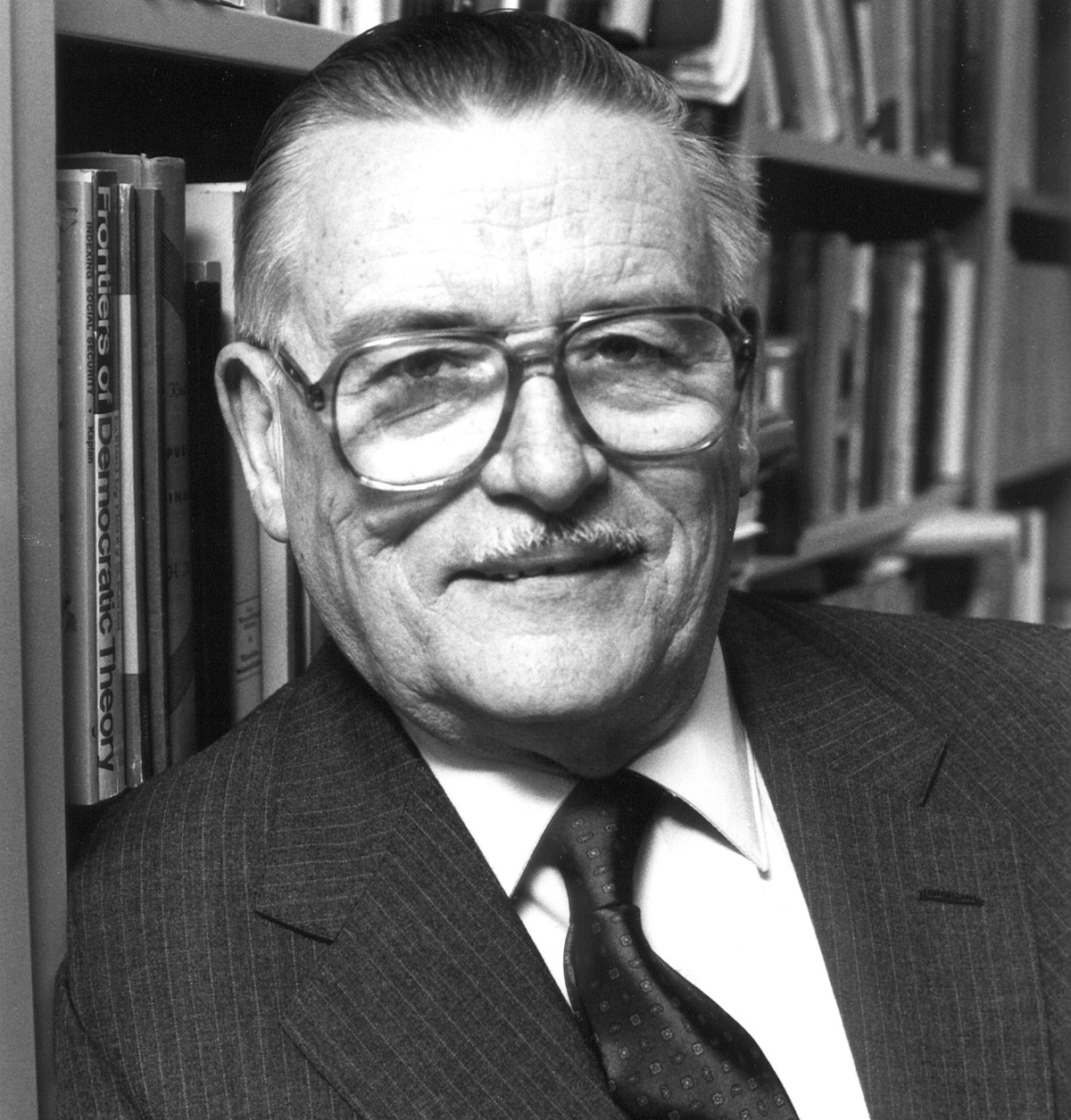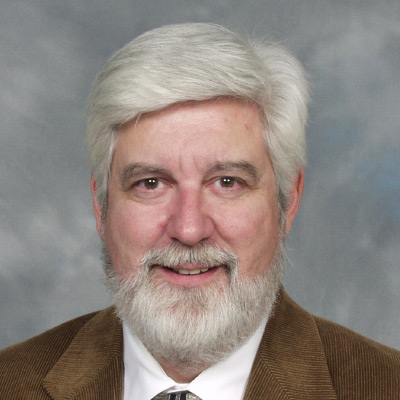James M. Buchanan was born in Murfreesboro, Tenn., in 1919. The son of a poor, politically populist farmer, he managed to enter Middle Tennessee State College, where he received a bachelor’s degree in 1940. He obtained a master’s degree the following year from the University of Tennessee and a doctorate from the University of Chicago in 1948.
While he was at Chicago, two important events changed Buchanan’s life: He met Frank Knight,[1] and he found and translated an essay by the great Swedish economist Knut Wicksell.[2] From Knight, Buchanan says he learned “the message that there exists no god whose pronouncements deserve elevation to the sacrosanct, whether god within or without the scientific academy. Everything, everyone, anywhere, anytime—all is open to challenge and criticism.”[3]
From Wicksell, Buchanan concluded that governments are not efficient, purely altruistic entities that effortlessly correct market imperfections. Instead, governments are aggregates of individuals pursuing private rather than the public interest through regulations and tax laws. These private interests create wasteful lobbying efforts known as rent seeking.
Buchanan’s view of public finance, and hence, the appropriate size of the state, is derived from a model in which the state supplies its constituents with public goods or services, which are paid for with tax revenues. The only appropriate rule under such conditions, he has argued, would be unanimity among citizens. This is not possible in practice, but a constitutional order that defends the rights of minorities is acceptable to Buchanan and other public choice theorists. Public choice economists support strong legal rules that constrain rentseeking special interests from undermining an appropriate public-goods process.
After graduating from Chicago, Buchanan held a number of teaching positions, beginning as an associate professor at the University of Tennessee in 1948, making full professor there in 1950, then moving to Florida State University. He made an important move in 1956 to the University of Virginia in Charlottesville, where he taught and chaired the economics department through 1961. During this period, he resided for a year in Italy, studying their tradition of public finance and political theory, an experience that further influenced his theoretical directions.
Returning from Europe, Buchanan established the Thomas Jefferson Center for Political Economy at the University of Virginia and began attracting like-minded thinkers and students to Charlottesville. Working closely with Gordon Tullock, G. Warren Nutter and Kenneth Elzinga, he oversaw the formative years of the new economic paradigm called public choice theory. Buchanan never cared for this name, but it caught on at a 1967 meeting held in Chicago under the cumbersome title of the Committee for the Study of Non-Market Decision Making. The renamed Public Choice Society was born at that meeting.[4]
After spending a year at the University of California at Los Angeles in 1968, Buchanan moved his public choice center from Charlottesville to Virginia Polytechnic Institute in Blacksburg, where he served as a university distinguished professor from 1969 to 1983. But the final move came in 1983 when Buchanan took a position at George Mason University in Fairfax, Va., just outside Washington, D.C., and brought the Center for Study of Public Choice with him. He remains today its advisory general director.
During his prolific career, Buchanan has authored or co-authored more than 35 books, translated two others, contributed chapters to about 300 others, and authored or co-authored hundreds of articles—an amazing publication record even if there were 10 of him. His curriculum vita is over 80 pages long and can be downloaded from www. gmu.edu. In 1986, he was awarded the Nobel Memorial Prize in Economic Sciences.
Throughout his career, Buchanan has dismissed two issues that typically dominate economists’ thinking: He has never cared about public opinion of his work, and he does not care whether his work makes the world a better place.[5] Buchanan’s attitudes clearly reflect Knight’s skepticism regarding human attempts to better society as a whole. Buchanan’s opinion on why he has always been an outsider in the economics profession turns on three propositions:
First, I have been influenced by Frank Knight and F. A. Hayek in their insistence that the problem of social order is not scientific in the standard sense. Second, I was greatly influenced by Knut Wicksell’s admonition that economists cease acting as if government were a benevolent despot. Third, I rejected, very early in my thinking, the orthodox economist’s elevation of allocative efficiency as an independent standard of evaluation.[6]
At first glance, public choice theory seems to be nothing more than common sense: Governments are collections of individuals whose interaction is determined by the same self-interest that motivates people in the private sector. The simple view that government is a collective decisionmaking process that altruistically solves social problems has a long and, according to Buchanan, romantic tradition both in political theory and in economics. Because of his thorough, individualistic approach to government and his adherence to subjective-cost doctrine,[7] his public finance models lie outside the neoclassical mainstream belief in the collective problem-solving model and in measurable, explicit opportunity costs. A pure subjective-cost approach denies that the actual costs of any action can ever be known, even by the decisionmaker(s), because the act of choice is itself cost, subjectively perceived. A theorist adhering to this doctrine would not carry out any benefit–cost analysis, as costs are inherently not observable and, therefore, not measurable.
Although the economics profession has resisted Buchanan’s arguments, public choice theory has, nonetheless, found its way into public finance discussions and has had a strong influence on government policies. As many economists came to doubt the efficacy of large, state-funded programs, they saw public choice theory as a way to examine what has come to be known as government failure. For decades following Arthur Cecil Pigou’s famous book The Economics of Welfare, economists saw government as a disinterested agency that could correct for market failures. Buchanan and other public choice theorists altered the debate by proposing that government may not really correct problems in the marketplace because of the wealth trading, or rent seeking, that occurs during the legislative process.
Extending his view that public policy emerges from the interaction of selfinterested individuals led Buchanan to a systematic study of the institutions and, in the case of the United States, the constitutional parameters within which public policy decisions are made. Buchanan’s analyses are always done within the framework of political economy rather than pure economics. Political economy deals with the understanding of collective decisionmaking and its wealth and income distribution effects on society. While some economists—notably David Ricardo and his followers—have always been concerned with income distribution, they have not approached the problem from a public choice perspective, preferring to concentrate on the distributive outcomes of market processes.
Although public choice theory seems to favor outcomes supported by society’s more conservative members, Buchanan considers himself completely apolitical:
I resist, and resist strongly, any and all efforts to pull me toward positions of advising on this or that policy or cause. I sign no petitions, join no political organizations, advise no party, serve no lobbying effort. Yet the public’s image of me, and especially as developed through the media after the Nobel Prize in 1986, is that of a rightwing libertarian zealot who is antidemocratic, anti-egalitarian, and antiscientific. I am, of course, none of these and am, indeed, the opposites. Properly understood, my position is both democratic and egalitarian, and I am as much a scientist as any of my peers in economics. But I am passionately individualistic, and my emphasis on individual liberty does set me apart from many of my academic colleagues whose mind-sets are mildly elitist and, hence, collectivist.[8]
Another thing that sets Buchanan apart is his view of the relationship between individuals and civilization. Influenced by what he considered the government’s overreaching in the 1960s, Buchanan believes the closer a person can come to self-sufficiency, the better off he is. That might seem a strange position for an economist, but Buchanan defies easy classification, even in how he lives his life:
I like space around me. I bought this century-old log cabin and started fixing it up and added to it and so forth. I kept buying more land, more land, more land. I found out something about my utility function as I did that, because I found out that every step I took toward genuine self-subsistence really gives me a big charge. If I can build a fire in my wood stove and don’t have to depend on electric heat if we have a power outage, then I’m that much happier. Or if I can go across the street to the spring and get a bucket of water as opposed to having an electric pump to the well, that gives me a charge. Or if I grow my own vegetables or pick my own berries, which I’m doing now. This year there is a good blackberry crop. I became more and more interested in having at least a backup, so selfsubsistent existence really did give me a lot of utility.[9]
As this quote shows, Buchanan’s theories are exemplified in his own lifestyle.
Notes
[1] Formaini, Robert L. (vol. 7), “Frank H. Knight: Origins of the Chicago School of Economics,” Federal Reserve Bank of Dallas Economic Insights, No. 3.
[2] Wicksell, Knut (1967), Finanztheoretische Untersuchungen (Jena, 1896), trans. by James M. Buchanan as “A New Principle of Just Taxation,” in Classics in the Theory of Public Finance, ed. Richard A. Musgrave and Alan T. Peacock (New York: St. Martin’s Press), 72–118, orig. pub 1958.
[3] Breit, William, and Roger W. Spencer, eds. (1997), Lives of the Laureates, 3rd ed. (Cambridge, Mass.: MIT Press). 165.
[4] “Interview with James Buchanan,” Federal Reserve Bank of Minneapolis The Region, September 1995, minneapolisfed.org/pubs/ region/95-09/int959.cfm.
[5] Buchanan, James (1992), “From the Inside Looking Out,” in Eminent Economists: Their Life Philosophies, ed. Michael Szenberg (Cambridge, UK: Cambridge University Press), 98–106.
[6] Buchanan (1992), 103. Also see Formaini, Robert L. (vol. 4), “Hayek: Social Theorist of the Century,” Federal Reserve Bank of Dallas Economic Insights, No. 1. (vol. 4).
[7] Buchanan, James (1999), Cost and Choice: An Inquiry in Economic Theory (Indianapolis, Ind.: Liberty Fund), orig. pub. 1969.
[8] Buchanan, James (1992), “From the Inside Looking Out,” in Eminent Economists: Their Life Philosophies, ed. Michael Szenberg (Cambridge, UK: Cambridge University Press), 105–6.
[9] “Interview with James Buchanan,” Federal Reserve Bank of Minneapolis The Region, September 1995, minneapolisfed.org/pubs/ region/95-09/int959.cfm.








